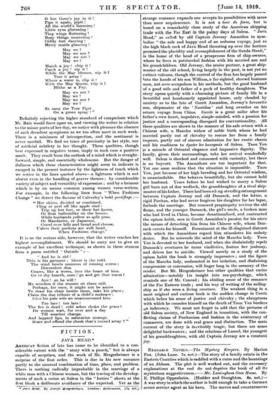FICTION.
JAVA HEAD.* AMERICAN fiction of late has come to be identified to a con- siderable extent with the story with a punch," but is always capable of surprises, and the work of Mr. Hergesheimer is a surprise of the first order. This is due in his new romance partly to the unusual combination of time, place, and problem. There is nothing radically improbable in the marriage of a white man with a Chinese woman, but the tracing of the develop- ments of such a union at Salem in the " forties " shows at the first blush a deliberate avoidance of the expected. Yet as the
• Jars Heal. By -.Iveeph Hergeshelmer. London : Heinemann. Va. net.]
strange romance expands one accepts its possibilities with more than mere acquiescence. It is not a tour de force, but is based on a remarkably close study of the American shipping trade with the Far East in the palmy days of Salem. "Jam Head," so coiled by old Captain Jeremy Ammidon to etym. bolize "the safe and happy end of an arduous voyage, just as the high black rock of Java Head thrusting up over the horizon promised the placidity and accomplishment of the Sunda Strait," is the home of the head of a prosperous firm of ship.owners, where he lives in patriarchal fashion with his married son and his grandchildren. Old Jeremy, the senior partner, a great ship- master of the old school, living largely in the past, is not yet an extinct volcano, though the control of the firm has largely passed into the hands of his son William, a far-sighted, shrewd business man, not over-scrupulous in his methods, but the good husband of a good wife and father of a pack of healthy daughters. The story opens quietly with a charming picture of family life in a beautiful and handsomely appointed house, only clouded by anxiety as to the fate of Gerrit Ammidon, Jeremy's favourite son, shipmaster of the ' Nautilus ' and long overdue on his return voyage from China. Gerrit is a great sailor after his father's own heart, impulsive, simple-minded, with a passion for justice and a corresponding disregard for conventionality. All these qualities are shown in the manner of his safe return with a Chinese wife, a Manchu widow of noble birth whom he had married partly out of chivalry to rescue her from a family impasse, partly out of sincere admiration for her exotic charm and his readiness to !pater les bourgeois of Salem. Taou Yen is a miracle of Oriental elegance and impassive dignity. The family, given their surroundings, take her arrival wonderfully well. Salem is shocked and consumed with curiosity, but there is no boycott. The Ammidons are too important for that. Yet one soon realizes that the situation is impossible. Taou Yen, just because of her high breeding and her Oriental wisdom, is unassimilable. She behaves beautifully, but she cannot hold her husband. Years before he had wished to marry a Salem girl born out of due wedlock, the granddaughter of a rival ship- master of his father. There had been a lcng-standing estrangement between Captain Jeremy and old Dunsack, and the latter, a rigid Puritan, who had never forgiven his daughter for her lapse, forbade the marriage. But renewed propinquity revives the old flame, and the younger Dunsack, the girl's uncle, a broken man who had lived in China, become denationalized, and contracted the opium habit, sees in Gerrit Ammidon's passion for his niece the means of detaching him from his Chinese wife, whom Dun- sack covets for himself. Resentment at the ill-disguised distrust with which the Ammidons regard him stimulates his unholy desire. But he misreads the mind of the Manchu lady. Taou Yen is devoted to her husband, and when she disdainfully repels Dunsack's overtures he turns vindictive, fosters her jealousy, and drives her to suicide. Viewed merely as a study of the opium habit the book is strangely impressive ; and the figure of the Manchu lady, undaunted in her isolation, and disdaining compromise or concession, will linger long in the memory of the reader. But Mr. Hergesheimer has other qualities that excite admiration—notably Lis insight into sea-psychology, which reminds one of Mr. Conrad ; his abiding sense of the romance of the Far Eastern trade ; and his way of writing of the sailing- ship as if she were a living creature. The weakest thing in a most original and curious book is the sudden change in Gerrit which belies his sense of justice and chivalry ; the abruptness with which he consoles himself on the death of Taou Yen borders on indecency. We must not forget to add that the pictures of old Salem society, of New England in transition, with the con- flicting claims of Puritanism and fashion in the aristocracy of commerce, are done with real grace and distinction. The main current of the story is inevitably tragic, but there are some delightful backwaters ; and the relations of Laurel, the youngest of his granddaughters, with old Captain Jeremy are a constant joy.


































 Previous page
Previous page